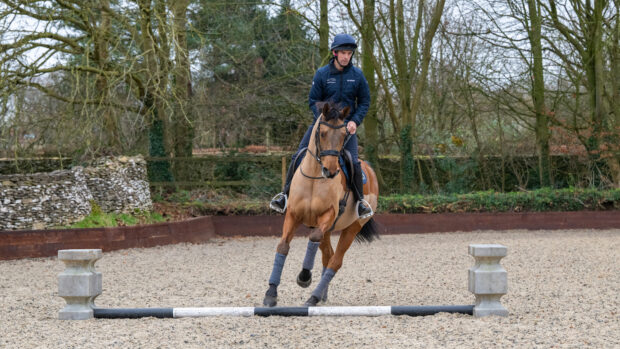Promotional Feature with Flexineb
Equine asthma is common; 14 % of UK horses are affected by a severe form of the disease and many more suffer with milder signs.
The chronic, progressive nature of the condition, which develops in response to allergens that cause inflammation and thickening of the airways, means it can have a significant impact on the welfare of affected horses. Typically horses “flare up” in summer in response to pollen but equine asthma can be a year-round problem as horses react to the allergens in dust, mould and other irritant airborne particles.
A breath of fresh air

Management changes, including using dust-free bedding, soaking or steaming hay and optimising stable ventilation, play a vital role in managing the condition. However, sometimes these changes alone are not enough to alleviate clinical signs and restore performance. Early intervention and prompt veterinary treatment are important to help reverse some of the inflammatory changes in the lungs and reduce the risk of permanent airway remodelling.
Nebulisation is an effective means of delivering prescribed medication directly to the lungs and lower airways in affected horses. Nebulisers may also be used for routine airway maintenance therapy, helping minimise the impact of respiratory issues on performance.
Riding high: Harry Meade’s Flexineb story
Harry Meade, one of Britain’s leading event riders and currently number five in the FEI world rankings, explains that nebulisation is integral to the management of several of the horses on his yard, but none more so than Away Cruising, his experienced five-star campaigner. The Irish-bred gelding had great potential, so when he was diagnosed with equine asthma eight years ago, it was not the news team Meade wanted to hear.
Harry says: “Respiratory diseases like equine asthma not only have a negative impact on a horse’s general wellbeing but also impact their athletic performance, in particular their anaerobic work. So, performance across country is particularly likely to be affected, as well as the quality of their fitness work in training.
“After Away Cruising was diagnosed with chronic low-grade equine asthma, we worked with our vet to put a management plan into place, and nebulisation formed a key part of this. We’ve used a nebuliser in the run-up to and throughout each of his five-star events ever since. He’s successfully competed for the past eight seasons on this regime and we’ve achieved great results together. This wouldn’t have been possible if his equine asthma wasn’t well controlled and the Flexineb remains a really important part of his preparation for events.”
Daily maintenance

Harry says that for Away Cruising, plus any other horses on the yard with respiratory issues, they use the Flexineb on a daily basis, usually before a training session. For those with more severe signs or to manage a flare-up, that may be increased to twice daily – before they work and again later in the afternoon.
Harry adds that the Flexineb is easy to use, saying: “The horses tend to relax and enjoy the treatment, which lasts around 10 minutes. We then clean the medication cup with distilled water after each use so it’s ready for the next day.”
Find out more about the Flexineb, or buy a nebuliser




